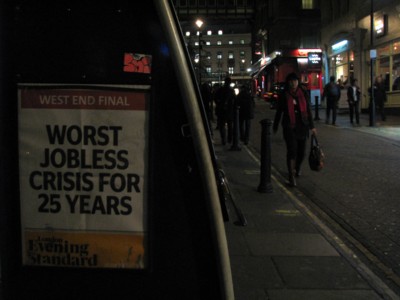This evening I dined with a friend, and on my way there took this snap of an Evening Standard headline. A couple of years ago I thought that the Evening Standard itself – never mind these billboards – would soon be extinct. But although diminished in number, these headlines are still a familiar part of the London scene, now as then usually telling of catastrophe of one kind or another, public or personal. This evening’s offering was no exception:
Here‘s the story. Depending on your preferred explanation for this sad circumstance, you’ll pick out a different bit of the story. I pick this:
The shocking new total was published today as Bank of England governor Sir Mervyn King warned Britain is in danger of sliding back into recession.
He downgraded his growth forecasts again, saying the economy will expand by one per cent this year and next, a fraction of the hoped-for rate.
As Instpundit would say: Unexpectedly! It would appear that quantitative easing is proving less than completely stimulating. We here are not shocked by this bad unemployment news.
For a little light relief, here’s a snap I took later, on my way home:
The advertising trade was bound to take advantage sooner or later of the wave of health and safety signage that is such a feature of British life just now. This is the first time I’ve noticed it, but I’m sure others have seen such things many times already.






I’m not surprised grisly youth can’t find employment. If I were looking to hire a young person, I’d want somebody polite. 🙂
Nice information ……………The advertising trade was bound to take advantage sooner or later of the wave of health and safety signage that is such a feature of British life just now.
1m UK youth priced out of work. By Order.
I’m not sure I understand unemployment from a Libertarian and/or Austrian economics perspective. Obviously government make-work schemes don’t create wealth. And I can see how intervention makes it harder to employ people. But I’m struggling to put together a coherent argument for why laissez faire would inevitably lead to maximum employment. And then there is Tim Worstall pointing out that jobs are a *cost*. I think I need a straightforward essay to help me fit all the pieces together.
As for that poster: making health claims? Not sure you can do that!
Rob, as much as the government make-work schemes don’t help, neither do the government make-not-work schemes. There is not only the minimum wage at issue but that businesses have to compete with the government paying people not to work.
Who said that maximum employment is a “good thing”? What if someone inherited a fortune and lives off it for the rest of his life – what’s wrong with that? And what is properly considered ’employment’? What if that same person lets his money “work” for him? This is all a meaningless non-problem.
If the term “laissez-faire” means anything it means allowing markets (i.e. voluntary human choices) to work. And that includes labour markets.
Even after a credit money bust (and a credit money bubble is, in my view, a violation of private property rights in money – see De Soto’s “Money, Bank Credit and Economic Cycles”) unemployment soon goes – UNLESS government interventionism (such as welfare schemes, or pro union laws, or direct government intervention) prevents this.
In 1921 Herbert “The Forgotten Progressive” Hoover failed to convince President Warren Harding to allow him to indulge his interventionist desires – the economy had recovered and unemployment gone before Hoover could get involved.
But in 1929 Progressive (not “laissez-faire”) Hoover was President and he was able to prevent markets clearing, prevent the price (and wage) system working.
This “keeping up of demand by keeping up wage rates” did not have good consequences for unemployment.
Someone who says “nominal incomes must never be allowed to fall” (as someone recently said on a “Free Banking” website – although I hope it was a joke) is really saying “mass unemployment must be enforced – the market must not be allowed to clear”.